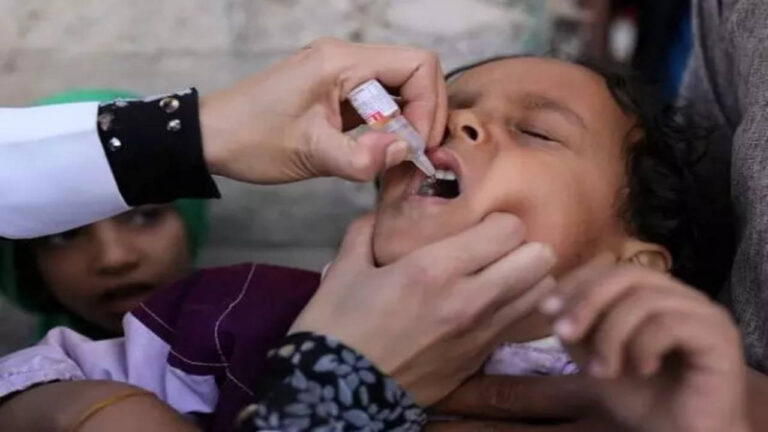QUETTA: The fifth case of polio has been confirmed in Quetta, Balochistan this year, raising concerns about poor surveillance and a possible spread of the disease at a critical time for the polio eradication campaign, Dawn reported.
The case, which occurred on 29 April and was confirmed on 8 June, highlights a significant six-week delay in diagnosis and indicates a major gap in the identification and response to poliovirus infections.
The victim was a two-year-old boy from UC Tamil-i-Now, Ganj Bypass, Quetta, who tragically died before the polio virus could be confirmed.
According to a report by the National Institutes of Health (NIH) Regional Reference Laboratory, the child initially presented for treatment at a private hospital in Quetta with symptoms of diarrhea and vomiting, but 10 days later, he developed muscle weakness in both his lower limbs, which gradually worsened and eventually affected his upper limbs as well, Dawn reported.
The boy was subsequently admitted to the National Institute of Child Health (NICH) in Karachi where he was diagnosed with Acute Flaccid Paralysis (AFP). Despite futile medical efforts, he succumbed to the disease on May 22.
Samples taken from three of the victim’s contacts revealed the presence of wild poliovirus type 1 (WPV1) in one brother and one cousin living in the same household. Importantly, there was no history of recent travel to other districts before the onset of paralysis, suggesting community transmission.
Records show the child had received five vaccinations during a booster vaccination drive, but an investigation is underway to determine whether the incident was the result of vaccine refusal.
Prime Minister’s National Health Services Coordinator Malik Mukhtar Baraz stressed that until Pakistan achieves polio eradication, children will remain vulnerable to the debilitating disease.
Muhammad Anwarul Haq, coordinator of the National Emergency Operations Centre for Polio Eradication, stressed ongoing efforts to investigate the source of the virus and identify vaccination gaps, including targeting people who may have missed out on polio vaccinations to prevent further outbreaks.
The case, which occurred on 29 April and was confirmed on 8 June, highlights a significant six-week delay in diagnosis and indicates a major gap in the identification and response to poliovirus infections.
The victim was a two-year-old boy from UC Tamil-i-Now, Ganj Bypass, Quetta, who tragically died before the polio virus could be confirmed.
According to a report by the National Institutes of Health (NIH) Regional Reference Laboratory, the child initially presented for treatment at a private hospital in Quetta with symptoms of diarrhea and vomiting, but 10 days later, he developed muscle weakness in both his lower limbs, which gradually worsened and eventually affected his upper limbs as well, Dawn reported.
The boy was subsequently admitted to the National Institute of Child Health (NICH) in Karachi where he was diagnosed with Acute Flaccid Paralysis (AFP). Despite futile medical efforts, he succumbed to the disease on May 22.
Samples taken from three of the victim’s contacts revealed the presence of wild poliovirus type 1 (WPV1) in one brother and one cousin living in the same household. Importantly, there was no history of recent travel to other districts before the onset of paralysis, suggesting community transmission.
Records show the child had received five vaccinations during a booster vaccination drive, but an investigation is underway to determine whether the incident was the result of vaccine refusal.
Prime Minister’s National Health Services Coordinator Malik Mukhtar Baraz stressed that until Pakistan achieves polio eradication, children will remain vulnerable to the debilitating disease.
Muhammad Anwarul Haq, coordinator of the National Emergency Operations Centre for Polio Eradication, stressed ongoing efforts to investigate the source of the virus and identify vaccination gaps, including targeting people who may have missed out on polio vaccinations to prevent further outbreaks.

